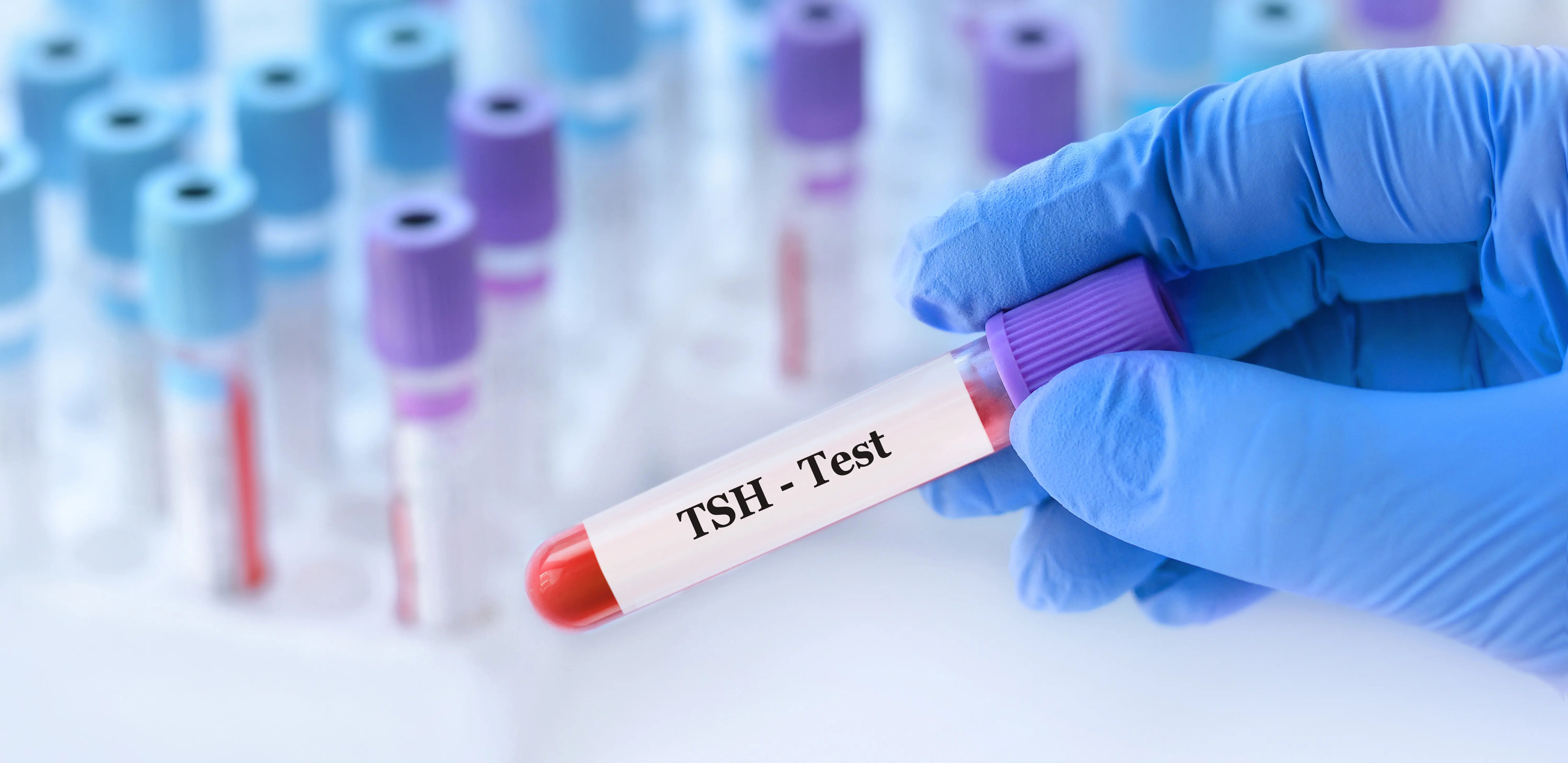What Leads To Signs Of Thyroid Disease Test And Types
Discover the signs of thyroid disease, its causes, diagnostic tests, and different types. Learn how early detection helps in effective management and treatment.

Written by Dr. Siri Nallapu
Reviewed by Dr. Shaik Abdul Kalam MD (Physician)
Last updated on 13th Jan, 2026

Your thyroid is a small, butterfly-shaped gland at the base of your neck, but it acts as your body's master metabolic controller. When it's out of balance, it can affect everything from your energy levels and weight to your mood and heart rate. Understanding thyroid disease—its warning signs, the tests used for diagnosis, and the different types—is the first step toward taking control of your health. This guide will demystify this common condition, breaking down the complex medical jargon into clear, actionable information. Whether you're experiencing unexplained symptoms or simply want to be informed, we'll walk you through what you need to know about recognizing and diagnosing thyroid disorders.
What is the Thyroid and What Does It Do?
Before diving into disease, it's crucial to understand the thyroid's role. This tiny gland is part of your endocrine system and is responsible for producing hormones—primarily thyroxine (T4) and triiodothyronine (T3). These hormones travel through your bloodstream to every part of your body, regulating your metabolism. Think of them as the gas pedal for your cells; they dictate how fast your body uses energy, makes proteins, and controls how sensitive you are to other hormones.
A properly functioning thyroid maintains a delicate balance of these hormones, ensuring your body's systems run smoothly. When this balance is disrupted, it leads to a thyroid disorder, throwing your entire metabolic system out of sync.
Consult a Top Specialist
Common Signs and Symptoms of a Thyroid Problem
Thyroid symptoms are often vague and can be mistaken for stress, aging, or other health issues. They typically manifest in two opposite ways, depending on whether the gland is overproducing or underproducing hormones.
Symptoms of an Underactive Thyroid (Hypothyroidism)
When your thyroid doesn't produce enough hormones, your bodily functions slow down. Key symptoms of hypothyroidism include:
- Persistent fatigue and lethargy
- Unexplained weight gain or difficulty losing weight
- Feeling cold all the time (cold intolerance)
- Brain fog, forgetfulness, and depression
- Dry skin, brittle hair, and hair loss
- Constipation
- Heavy or irregular menstrual periods
- Muscle aches and stiffness
Symptoms of an Overactive Thyroid (Hyperthyroidism)
Conversely, when your thyroid is in overdrive, your body's systems accelerate. Key symptoms of hyperthyroidism include:
- Unexplained weight loss despite a normal or increased appetite
- Anxiety, nervousness, and irritability
- Rapid or irregular heartbeat (palpitations)
- Feeling hot and excessive sweating (heat intolerance)
- Tremors in your hands
- More frequent bowel movements
- Sleep disturbances and insomnia
- Thinning skin and fine, brittle hair
What Are the Main Types of Thyroid Disease?
Thyroid disease is an umbrella term for several conditions. The most common types include:
1. Hypothyroidism
This is the most prevalent thyroid disorder. The leading cause worldwide is iodine deficiency, but in developed countries, the most common cause is Hashimoto's thyroiditis, an autoimmune disease where the body's immune system mistakenly attacks and destroys the thyroid gland.
2. Hyperthyroidism
The most common cause of an overactive thyroid is another autoimmune condition called Graves' disease. In this case, the immune system produces antibodies that stimulate the thyroid to overproduce hormones. Other causes include thyroid nodules that become overactive.
3. Thyroid Nodules
These are lumps that form within the thyroid. The vast majority are benign (non-cancerous) and don't cause symptoms. However, some can produce excess hormones (causing hyperthyroidism), and a small percentage can be cancerous.
4. Thyroiditis
This refers to inflammation of the thyroid, which can be painful or painless. It often causes a temporary phase of hyperthyroidism as stored hormone leaks out, followed by a period of hypothyroidism as the gland becomes depleted. It often corrects itself over time.
5. Thyroid Cancer
While hearing the word "cancer" is frightening, thyroid cancer is generally one of the most treatable forms of cancer. It often presents as a lump in the neck and has a very high survival rate, especially when detected early.
What Leads to Thyroid Disease? Key Causes and Risk Factors
Understanding the causes of thyroid disease can help you understand your own risk. Key factors include:
- Autoimmune Diseases: As mentioned, Hashimoto's and Graves' disease are leading culprits.
- Family History: A genetic predisposition plays a significant role. If a close relative has a thyroid condition, your risk is higher.
- Gender: Women are 5 to 8 times more likely than men to develop a thyroid disorder.
- Age: Risk increases with age, particularly for women after menopause.
- Iodine Deficiency: Iodine is essential for thyroid hormone production. While rare in countries with iodized salt, it's a major cause globally.
- Previous Thyroid Issues: A history of thyroid problems or surgery increases future risk.
- Certain Medications: Some drugs, like lithium and amiodarone, can affect thyroid function.
- Radiation Exposure: Treatment to the head, neck, or chest for other cancers can increase risk.
How is Thyroid Disease Diagnosed? The Essential Tests
You cannot diagnose a thyroid condition based on symptoms alone. If your doctor suspects a problem, they will order a series of blood tests for thyroid function. Here’s what they measure:
1. TSH (Thyroid-Stimulating Hormone) Test
This is the most sensitive and primary screening test for thyroid disease. TSH is not a thyroid hormone itself; it's a hormone released by the pituitary gland in your brain to tell the thyroid what to do.
- High TSH typically indicates an underactive thyroid (hypothyroidism)—the brain is shouting to get a response.
- Low TSH typically indicates an overactive thyroid (hyperthyroidism)—the brain is whispering because it sees too much hormone.
2. T4 (Thyroxine) Tests
This test measures the actual level of the main hormone produced by your thyroid. It helps confirm the TSH reading.
- Low T4 + High TSH = Confirms hypothyroidism.
- High T4 + Low TSH = Confirms hyperthyroidism.
3. T3 (Triiodothyronine) Tests
T3 is the more active form of thyroid hormone. T3 tests are most useful for diagnosing hyperthyroidism, as T3 levels can be extremely high in Graves' disease.
4. Thyroid Antibody Tests
These tests detect the presence of antibodies associated with autoimmune thyroid disease, such as:
- Anti-thyroperoxidase (TPO) antibodies: Present in Hashimoto's and Graves'.
- Thyrotropin receptor antibodies (TRAb): Specific to Graves' disease.
A positive antibody test confirms an autoimmune condition as the underlying cause.
Additional Diagnostic Tools
Thyroid Ultrasound: This imaging test uses sound waves to create a picture of the thyroid. It's used to check for nodules, inflammation, or changes in size and texture.
Radioactive Iodine Uptake (RAIU) Scan: This test measures how much iodine your thyroid collects from the bloodstream, helping to determine the cause of hyperthyroidism.
Get Your Health Assessed
Conclusion
Thyroid disease is a highly manageable condition, but the first and most crucial hurdle is recognition and diagnosis. The symptoms can be subtle and life-disrupting, often leaving individuals feeling misunderstood or dismissed. By understanding the common signs of thyroid problems, the different types of thyroid disorders like Hashimoto's and Graves' disease, and the essential role of thyroid function tests, you are empowered to advocate for your own health.
Consult a Top Specialist
Consult a Top Specialist

Dr. Vivek D
General Physician
4 Years • MBBS
Bengaluru
PRESTIGE SHANTHINIKETAN - SOCIETY CLINIC, Bengaluru

Dr. Anand Ravi
General Physician
2 Years • MBBS
Bengaluru
PRESTIGE SHANTHINIKETAN - SOCIETY CLINIC, Bengaluru

Dr Syed Mateen Pasha
General Physician
2 Years • MBBS
Bengaluru
PRESTIGE SHANTHINIKETAN - SOCIETY CLINIC, Bengaluru

Dr. Srujana Mulakalapalli
General Physician/ Internal Medicine Specialist
5 Years • MBBS, MD (GENERAL MEDICINE)
Bengaluru
Apollo Medical Center, Marathahalli, Bengaluru
(25+ Patients)

Dr. Harshendra Jaiswal
General Physician/ Internal Medicine Specialist
12 Years • MBBS , MD (General medicine)
Kolkata
108 DHANA DHANVANTARI Clinic, Kolkata
(25+ Patients)
Consult a Top Specialist

Dr. Vivek D
General Physician
4 Years • MBBS
Bengaluru
PRESTIGE SHANTHINIKETAN - SOCIETY CLINIC, Bengaluru

Dr. Anand Ravi
General Physician
2 Years • MBBS
Bengaluru
PRESTIGE SHANTHINIKETAN - SOCIETY CLINIC, Bengaluru

Dr Syed Mateen Pasha
General Physician
2 Years • MBBS
Bengaluru
PRESTIGE SHANTHINIKETAN - SOCIETY CLINIC, Bengaluru

Dr. Srujana Mulakalapalli
General Physician/ Internal Medicine Specialist
5 Years • MBBS, MD (GENERAL MEDICINE)
Bengaluru
Apollo Medical Center, Marathahalli, Bengaluru
(25+ Patients)

Dr. Harshendra Jaiswal
General Physician/ Internal Medicine Specialist
12 Years • MBBS , MD (General medicine)
Kolkata
108 DHANA DHANVANTARI Clinic, Kolkata
(25+ Patients)
More articles from Thyroid
Frequently Asked Questions
Can you have thyroid disease with normal TSH levels?
Yes, in some cases. This is sometimes called 'subclinical' thyroid disease. Some patients may have normal TSH but experience symptoms and have abnormal T3/T4 or positive antibodies. A full thyroid panel provides a more complete picture.
What is the most accurate test for hypothyroidism?
While the TSH test is the primary screening tool, a comprehensive diagnosis often requires a full panel including Free T4 and thyroid antibody tests (especially for TPO antibodies) to identify an autoimmune cause like Hashimoto's.
Are at-home thyroid test kits reliable?
Many reputable companies offer reliable at-home collection kits that are then analyzed in certified labs. However, the results should always be interpreted by a healthcare professional who can consider your full clinical picture, including symptoms and physical exam findings.
Can stress cause thyroid problems?
While stress alone doesn't directly cause autoimmune thyroid disease, it can be a trigger that exacerbates an underlying condition or disrupts thyroid function, potentially worsening symptoms.
What does it mean if my thyroid ultrasound shows nodules?
The vast majority of thyroid nodules are benign. Your doctor will evaluate them based on size, appearance on ultrasound, and your symptoms. Only a small percentage require a biopsy to check for cancer.



